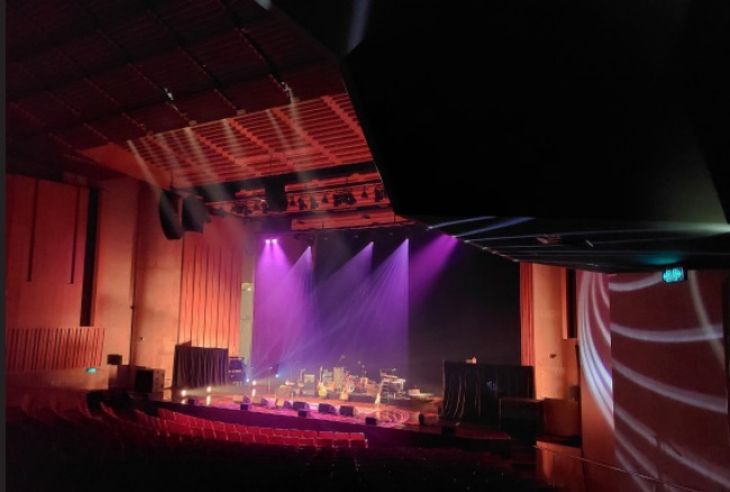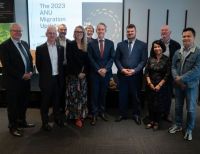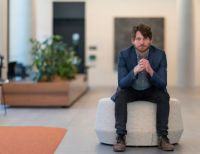Geraldine Schmid wants to lead by example in helping The Australian National University achieve its below zero targets. She and her team, Venues and Functions, have created the University's first sustainability plan for a building that aligns with the ANU sustainability commitments, including becoming carbon negative by 2030.
"I personally believe that in our fast-paced lives we tend to forget about the toll we place on our planet and our immediate environment. It's so much easier and cheaper these days to purchase something online than it is to make something or reuse items.
As a society we just don't have time for this anymore and our team felt that it was important to stop and really examine what we do and how we do it. As we manage the biggest event venues on campus and host some of the largest events, it was our feeling that we should really be leading by example. We felt that as a team we really wanted to make sure we were on the right track to hit the below zero targets."
Geraldine has worked at ANU since 2018 and currently manages functions on campus, Kambri venues, Llewellyn Hall, ANU apartments, and accommodation bookings for satellite sites.
Her team, part of the Facilities and Services (F&S) Division, support the University's events, venue management and hire, licensing, event and venue marketing, Kambri activations, and staff/external accommodation services. Geraldine says her favourite part of working at ANU is seeing students having a great time at events the team has helped organise.
Reflecting on her time at ANU, she notes one of her biggest accomplishments include the ANU Liquor Statute and Liquor Policy that were passed on 1 January 2023, and the development of the Llewellyn Hall Sustainability Plan in 2022 (developed as a part of the Facilities and Services Divisional Plan). She and her team believe that it is important to lead by example, and the creation of a sustainability plan is their way of contributing to the University's below zero targets.
Geraldine has shared some insights below about her time at ANU and her efforts to make it a greener campus.
What's the day-to-day of your role like?
Busy! We have multiple teams within our portfolio and with the quantity of events on campus, I can say there is always something happening. On a quiet day we might have five or six events happening in our venues alone. On a busy day in O-Week we might have 50+. I get to spend a lot of time working with ANUSA/PARSA and their associated student groups. I enjoy working on new ideas with them and supporting their event planning. That's probably my favourite part of the job. I've built some great relationships over the years and its nice when you walk across campus and a student stops to say hi or to let you know how successful their event was.
How have you grown professionally while on our team?
When I started at ANU I was overwhelmed with the complexity of its structure, and it took me a while to work it out. Over the years I've obtained a lot of knowledge and built a great network and I find that staff and students often come to me to ask for advice or to find answers. I think I've become a bit of a knowledge holder and I enjoy finding solutions for people. In a complex environment like ANU, finding someone who can point you in the right direction can be a huge time saver.
What is your team like?
One of my favourite things about working at ANU is the people. Our entire team is fantastic, they are all dedicated, and service orientated. They work hard to find solutions for clients and with most events happening outside standard hours they really go above and beyond to make sure staff and student events are successful. Big events like O-Week, graduations and Open Day on campus can be really busy (2023 O-Week we had 580+ events in February), but the team steps up and gives 100 per cent. You can usually see us running around like headless chooks pinpointing issues and calling in favours from other teams. That's the great thing about F&S, we all work together to ensure success. Our team wouldn't be able to do what we do without all the other areas of our division pitching in and helping.
What led to you creating a sustainability plan? What was involved in the process? How long did it take?
Our team really wanted to challenge ourselves and start planning/experimenting with new ways to do things. This was to align ourselves with the below zero targets but also to make sure we were ready for the release of the ANU Environmental Management Plan. We worked closely with the F&S Technical Team and the Below Zero Team to look at what our objective was, how to align this with existing or upcoming policy/plans and what we could realistically accomplish. We spent Semester 1 2022 investigating solutions and issues around recycling, products and services and used this to influence and to develop our plan. Some items were rather aspirational, noting that we may not reach the full potential of our noted targets. As we anticipated, this project has been a dynamic and evolving process, requiring us to adapt and pivot as needed, but with certain limitations such as budget or capacity.
What are some of the things you changed in your operations to be more sustainable?
We became the first ANU venue on campus in 2022 noted on the ACT Government disallowable instrument as a venue to remove use of single use of some single use plastics - single-use plastic straws, single-use plastic takeaway containers and single-use plastic plates and bowls. We now provide our Sustainability Plan, the disallowable instrument and highlight alternative food options/caterers when internal and external organisers hire the venue. Education is a small part of this bigger puzzle and getting on board with government initiatives helps us to educate others too.
What progress did you make last year?
We were the first ANU venue noted on the Disallowable Instrument, all our bar items are locally made and produced or obtained through certified fair-trade companies (with a highlight on sustainability), organised a soft plastics trial in Llewellyn Hall with two bins being in the building - this was in conjunction with the Fix My Campus team. Fix My Campus also assisted us in implementing our organics trial which now ensures our kitchens and main tenancy have access to organics bins where the food is recycled - we hope to minimise our general waste by two per cent in 2022, by diverting organics, soft plastics and bottles/cans from general waste. We are doing more, though these are some of the bigger items.
In 2022 we began collecting all of the cans and bottles from the bars at Llewellyn Hall (totalling 2600), with the intention of using this money to put back into the ANU community to further the work on sustainable initiatives. We have been really happy to partner with the ANU Kitchen Garden and made our initial donation a few weeks ago. We hope these funds help educate students and give back to our community. Now with the installation of the new can/bottle depository in Marie Reay Teaching Centre we can minimise our emissions by walking the cans across campus rather than driving to a deposit area off campus.
Challenges you faced when trying to become more sustainable?
We found that there seems to be a lot of information missing. For instance, what materials are better to recycle in Australia, especially Canberra. We found that aluminium cans were the best thing to recycle, though we found it hard to find information on where and when these items can be recycled. The lack of clear information on recycling practices can create confusion, like when cans are recycled in a location far from where they were purchased. It really complicated things when we found out our cans would be recycled in Wollongong. This requires the consideration of travel emissions, making it difficult to determine the most sustainable option. We also found that a lot if initiatives take time, staff time. Capacity does play a factor in setting something like this up initially and we have had to stop and start occasionally based on priorities.
Did you work with any other parts of the university?
We worked with the Below Zero team and the F&S technical teams for a few parts of our Sustainability Plan. Our team were lucky enough to have other teams and individual staff looking at projects that aligned with our own objectives and we were open to a collaborative dialog between different areas. Guy Walpole, the F&S Senior Mechanical Engineer, was already working closely with the Below Zero team on a change over from gas to electrical heating. This has a projection of 286,238kg per annum reduction in C02 across both the Peter Karmel and School of Music buildings. School of Music per annum CO2 reduction: 235 Tonnes, PK per annum CO2 reduction: 51 Tonnes. It seemed realistic to add in targets from other teams to highlight a holistic approach across multiple areas especially when the impact aligns with our own plan.
Are there more changes on the horizon this year? What progress is planned for the months ahead?
We are hopefully about to proceed with the Llewellyn Hall lighting tender which is a project that will span across multiple years. This capital project is planned to switch all our legacy lighting technology over to LED, saving up to 88 per cent on lighting power consumption and minimising our staff hours and consumables to maintain existing equipment. Facilities and Services are also planning on switching the School of Music gas boilers later in 2023 over to an electric heating system. We have also decided that it is time to include an additional area into our planning, Kambri Venues. We hope to have a second Sustainability Plan in action by the end of 2023 where we will implement a lot of our 'lessons learnt' from the Llewellyn Hall initiative.
How can others at ANU follow your lead? What advice would you have for them?
Our team are open to working with other Divisions, Schools and Colleges to offer guidance and insights gained from our time crafting and implementing a Sustainability Plan. Really the objective was to create a template for other areas as a starting point to make change.
Have you heard of any other areas following your lead yet?
With the development of the EMP and the progression of the Below Zero team I can see things starting to happen across campus, especially in line with sustainable events. We have had event organisers touch base to ask about sustainable alternatives to single use plastics and we are definitely seeing a highlighting of vegan and vegetarian options. For Open Day this year all the stickers were actually reusable, they can be washed and stored for next year. It was a great sustainable idea that was also cost effective. You can find many more great ideas like this in the ANU low carbon events guide is a great resource developed by the Below Zero team and is available on our Functions on Campus webpage for anyone wanting to make their events more sustainable and minimise their carbon footprint.
How can others on campus ensure they are hosting sustainable events?
I think the first step is to read the low carbon events guide awon't know how something will turn out unless you try. So, try it. We did, and so far, we have had positive feedback from across the University, it's something our team can be proud of. I think it's also important to note that there are other people out there doing great things in this space, don't be scared to copy those ideas. You don't need to reinvent everything, and we spent a lot of time looking at other venues across Australia to see what they were doing, and we did take on a lot of those external ideas.














